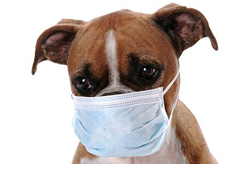
Canine Cough (also known as tracheo-bronchitis or kennel cough) is an infectious disease of dogs characterised by a harsh, hacking cough. Most people describe the cough as sounding like “something stuck in my dog’s throat.”
What Causes Canine Cough?
Numerous organisms may be involved in a case of Kennel Cough; it would be unusual for only one agent to be involved. Infections with the following organisms frequently occur concurrently to create a case of kennel cough:
• Bordetella bronchiseptica (bacteria)
• Parainfluenza virus
• Adenovirus type 2
• Canine influenza virus
• Mycoplasma canis
• Canine herpesvirus (very young puppies)
The classical combination for Kennel Cough is infection with Parainfluenza or Adenovirus Type 2 with Bordetella bronchiseptica. Infections involving the distemper virus or canine influenza are more prone to progressing to pneumonia – but pneumonia can readily result in any dog or puppy that is sufficiently young, stressed, or debilitated.
How Infection Occurs
An infected dog sheds infectious bacteria and viruses in respiratory secretions. These secretions become aerosolized and float in the air where they can be inhaled by a healthy dog. Therefore, transmission of organisms may also occur on toys, food bowls or other objects. Classically, dogs get infected when they are kept in a crowded situation like a kennel.
Diagnosing Canine Cough
We will typically look to see if your dog has been in a crowded situation recently, then use radiographs, swabs and other testing to identify if your dog has conditions such as bronchitis, pneumonia or any of the other kennel cough infectious agents listed.
How is kennel cough treated?
Most cases will resolve with time and rest. Uncomplicated canine cough can last for about 1-2 weeks with fits of coughing in a dog that otherwise seems normal. Even so, we recommend you bring your dog for a check over by our Vets as we can determine that there are no complicating factors that can worsen over time. We can also prescribe cough suppressants and antibiotics to hasten recovery if needed. We do recommend that during recovery your dog avoids strenuous exercise, especially if suffering from a pre-existing heart condition.
Vaccinations
Vaccinations provide good immunity, however are only available for some of the offending agents that cause canine cough. Therefore, there is no 100% guarantee that your dog will not contract canine cough in some form.
If your dog has started coughing, wheezing or showing issues with breathing it is recommended that you bring them into Pet Doctors as soon as possible. Please contact us on 5576 0400 to make an appointment.

